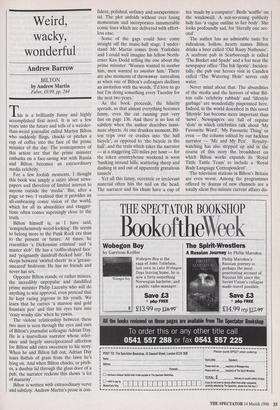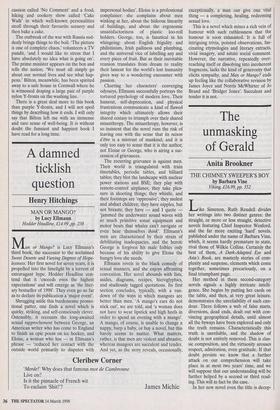Weird, wacky, wonderful
Andrew Barrow
BILTON by Andrew Martin Faber, £9.99, pp. 244 This is a brilliantly funny and highly accomplished first novel. It is set a few years into the future and tells of a weirder- than-weird journalist called Martyn Bilton who suddenly flings, chucks or pitches a cup of coffee into the face of the prime minister of the day. The consequences of this action are that the prime minister embarks on a face-saving war with Russia and Bilton becomes an extraordinary media celebrity. For a few foolish moments, I thought this book was simply a satire about news- papers and therefore of limited interest to anyone outside the 'media'. But, after a page or two, I realised that it provides an all-embracing comic vision of the world, which for all its absurdities and exagger- tions often comes suprisingly close to the truth.
Bilton himself is, as I have said, `comprehensively weird-looking'. He seems to belong more to the Punk Rock era than to the present or future. At times, he resembles 'a Dickensian criminal' and 'a master slob'. He has a 'coffin-shaped face' and 'poignantly dandruff-flecked hair'. He sleeps between 'swirled sheets' in a 'grease- smeared' bedroom. He has no friends and never has sex.
Opposite Bilton stands, or rather minces, the incredibly unpopular and dandified prime minister Philip Lazenby who will do anything to win approval, even pretend that he kept racing pigeons in his youth. We learn that he carries 'a maroon and gold fountain pen' and that his eyes turn into `crazy wonky slits' when he yawns. The violent relationship between these two men is seen through the eyes and ears of Bilton's journalist colleague Adrian Day. He is a marvellous narrator whose toler- ance and largely unreciprocated affection for Bilton add extra sweetness to his story. When he and Bilton fall out, Adrian Day tears fistfuls of grass from the lawn he's lying on. And when Bilton chucks, or pitch- es, a dustbin lid through the glass door of a pub, the narrator reckons this shows 'a lot of maturity'.
Bilton is written with extraordinary verve and subtlety. Andrew Martin's prose is con- fident, polished, unfancy and unexperimen- tal. The plot unfolds without ever losing momentum and incorporates innumerable comic lines which are delivered with effort- less ease.
Some of the gags could have come straight off the music-hall stage. I under- stand Mr Martin comes from Yorkshire and I could well imagine his fellow North- erner Ken Dodd telling the one about the prime minister: 'Women wanted to mother him, men wanted to smother him.' There are also moments of throwaway surrealism as when one of Bilton's colleagues declines an invitation with the words, 'I'd love to go but I'm doing something every Tuesday for the next two years.'
As the book proceeds, the hilarity spreads, so that almost everything becomes funny, even the cat running past very fast on page 136. And there is no loss of subtlety when the author describes inani- mate objects. At one drunken moment, Bil- ton trips over or crashes into 'the hall bicycle', as opposed to 'the bicycle in the hail', and the train which takes the narrator — at a staggering 220 miles per hour — for the token countryhouse weekend is soon `banking around hills, scattering sheep and dashing in and out of apparently gratuitous tunnels'.
Yet all this funny, eccentric or irrelevant material often hits the nail on the head. The narrator and his chum have a cup of tea 'made by a computer'. Birds 'scuffle' on. the windowsill. A not-so-young publicity lady has 'a vague outline to her body'. She looks profoundly sad, for 'literally one sec- ond'.
The author has an admirable taste for ridiculous, hollow, hearty names. Bilton drinks a beer called 'Old Rusty Nuthouse'. A seafront pub in Scarborough is called `The Bucket and Spade' and a bar near the newspaper office 'The Ink Spotte'. Inciden- tally, the pub our heroes visit in Camden called 'The Watering Hole' serves only water.
Never mind about that. The absurdities of the media and the horrors of what Bil- ton calls 'celebrity rubbish' and 'lifestyle garbage' are wonderfully pinpointed here. Indeed, in the world described in this novel `lifestyle' has become more important than `news'. Newspapers are full of regular `slots' in which celebrities talk about 'My Favourite Word', 'My Favourite Thing' or even — the column edited by our luckless narrator — 'Me and My Pen'. Royalty- watching has also stepped up and in the course of this story the broadsheet on which Bilton works expands its 'Royal Tittle Tattle Team' to include a 'Royal Body Language Correspondent'.
The television stations in Bilton's Britain are even worse. Among the programmes offered by dozens of new channels are a totally silent five-minute current affairs dis- cussion called 'No Comment' and a food, hiking and cookery show called 'Cake Walk' in which well-known personalities stroll through their favourite scenery and then bake a cake.
The outbreak of the war with Russia sud- denly brings things to the boil. 'The picture is one of complete chaos,' volunteers a TV pundit, 'and I would like to stress that I have absolutely no idea what is going on'. The prime minister appears on the box and tells the nation, 'We must all simply go about our normal lives and see what hap- pens.' Bilton, meanwhile, has been spirited away to a safe house in Cornwall where he is witnessed draping a large pair of purple nylon Y-fronts on the washing line.
There is a great deal more to this book than purple Y-fronts, and I will not spoil things by describing how it ends. I will only say that Bilton left me with an immense and rare sense of well-being. It is without doubt the funniest and happiest book I have read for a long time.



































































 Previous page
Previous page